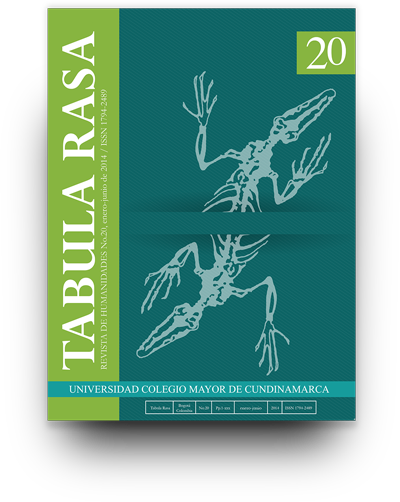Rhetorical Formulae in Rebusque —A Study Drawing Upon Halliday’s Social Semiotics
Las fórmulas retóricas del rebusque. Un estudio desde la semiótica social de Halliday
Show authors biography
In the research work on “Imaginaries among peddlers in Bogotá’s transportation system”, being developed at Universidad Colegio Mayor de Cundinamarca, one can note that when studying language in a context, a lexical item may change or get a deeper meaning as a result of the cultural and ideological situation it works in. This is the case of peddlers, in whose discourse targeting commercial exchange, the choice of certain lexical-grammatical resources and the use of a rhetorical method become key strategies to ensure day-to-day survival. Within the framework of Halliday’s social semiotics, and based upon a corpus of 65 sheets, this paper presents a thematic analysis, showing stereotypes that are crystallized on the dynamic of the mercantile act, along with iterations in opening, development and closing formulae that are observed in the rhetorics of rebusque.
Article visits 77 | PDF visits 51
Downloads
Amossy, R. y A. Herschberg Pierrot. 2001. Estereotipos y clichés. Buenos Aires: Eudeba.
Andrade M. y D., C. Muñoz. 2012. Estereotipos del discurso en la economía informal. En: VII Congreso Nacional de Estudios del Discurso. Universidad Distrital Francisco José de Caldas, Universidad Autónoma e Instituto Caro y Cuervo. Bogotá, septiembre 26, 27 y 28 de 2012.
Asqueta, C. y C. Muñoz Dagua. 2001. La fábula del buhonero. Bogotá: Universidad Jorge Tadeo Lozano y Corporación Universitaria Minuto de Dios.
Asqueta, C. y C. Muñoz Dagua. 2002. «El discurso de Prometeo». Mediaciones, (1): 19- 28.
Castoriadis, C. 1997. El avance de la insignificancia. Buenos Aires: Eudeba.
DANE. 2004. Informalidad laboral en las trece principales áreas y ciudades colombianas. Documentos técnicos sobre mercado laboral, documento de la dirección de metodología y producción estadística. http://www.dane.gov.co/files/investigaciones/empleo/mercado_ lab_colombiano/analisis_informalidad_urbana.pdf
Feige, E. L. 1990. “Defining and estimating underground and informal economies: The new institutional economics approach”. World Development (18): 989-1002.
Fries, P. 1983. “On the status of theme in English: arguments from discourse”, en J. S.
Petöfi y E. Sozer (eds.): Micro and macro connexity of texts. 116-152. Hamburg: Helmut Buske.
Halliday, M. A. K. 1994/2004. An introduction to functional grammar. Londres: Edward Arnold Publisher.
Montemayor-Borsinger, A. 2005. «Una perspectiva sistémico funcional de texto e interacción: las funciones de sujeto y tema». Revista de la Sociedad Argentina de Lingüística Rasal. 1: 25-36.
Muñoz D. C. 2014. La metáfora interpersonal léxico-gramatical y la divulgación científica. Bogotá: UCMC En imprenta.
Muñoz D. C. y M. C. Andrade. 2013. El valor en el discurso de la economía informal, en Memorias X Congreso Latinoamericano de Lingüística Sistémico Funcional (ALSFAL).
Gramática, discurso y alfabetización. Desafíos para la educación en Latinoamérica. 8 a 11 de octubre, 2013. Santiago de Chile, Pontificia Universidad Católica de Chile.
Oficina Internacional del Trabajo (OIT). 2007. La economía informal. Comisión de empleo y política social. Ginebra, 8 de febrero de 2007. Website: www. ilo.org/public/spanish/ standards /relm/gb/docs/gb298/pdf/esp




